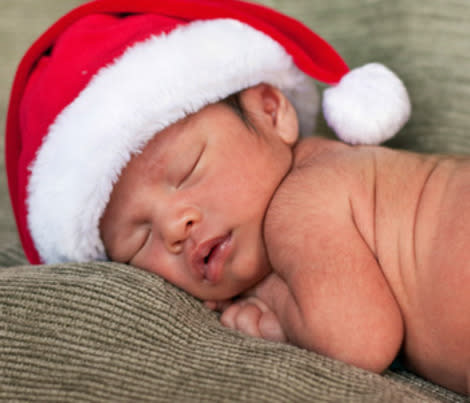Do Babies Dream?

by Chanie Kirschner, Mother Nature Network
I often wonder, as I watch my calmly sleeping baby randomly grin while she sleeps. What is she smiling about anyway? A bottle full of her delicious formula? A leisurely nap in the stroller in the afternoon breeze? Or is she perhaps having a terrible nightmare about her older brother sitting on her? Turns out it's probably none of the above.
Herein a little infant sleep primer. People go through five stages when they sleep. Four of these stages belong to non-REM sleep, and one stage is REM sleep - called such because of its characteristic rapid eye movements. As adults, we spend about one quarter of our sleep time in REM sleep - the time when our eyes jerk and bodies twitch. This is also the stage of sleep in which we dream. Infants actually spend much more time in REM sleep - about 50 to 80 percent of their sleep time is spent in this phase. Many people presume that infants do indeed dream during this stage, just as adults do, but since it's impossible to ask a baby to recount his dream (except for the E-Trade baby perhaps), it's impossible to know.
Also see: Should you let your baby cry it out?
Child psychologist and pediatric dream expert David Foulkes posits that babies use their REM sleep to develop new brain pathways, and later, even develop language. When babies are sleeping, they are processing knowledge. An interesting study was done in 2010 that proved that babies learned while they were sleeping, and learning rather quickly at that. Sleeping newborn babies who were played a musical tone followed by a gentle puff of air on their eyelids learned in just 15 minutes to expect the puff of air after the tone was played. Scientists measured brain activity and noted a tightening of the eyelids just after the babies heard the musical tone. Hence, a sleeping baby is a learning baby. All that learning doesn't leave much time for dreaming, says Foulkes, since their brains are so busy during REM sleep doing other things.
So at what age do we start to dream? Most cognitive psychologists believe that kids really start to have dreams with a real plotline when they are about 5 to 7 years old, about the time they develop a sense of self, which is necessary to insert themselves into dreams.
What's funny though is that my own kids have retold me dreams they've had in meticulous detail when they were just 3 and 4 years old. Heck, you might even remember dreaming - or having a nightmare - yourself at a very young age.
And speaking of nightmares … there are some who mistake night terrors in very young children for nightmares. While nightmares happen during REM sleep (just like dreams), night terrors occur during non-REM sleep, when a child is transitioning from one stage of non-REM sleep to another. Often, a child cries nonstop when he has a night terror and appears not to notice your presence. For a parent, night terrors can be frightening to watch, so make sure to seek medical help if night terrors are a concern for your child.
So there you have it, folks. Babies probably don't dream all that much, but don't fret about their dreamless sleep that much - there's important business going on inside that little head while she snoozes.
Related stories:
